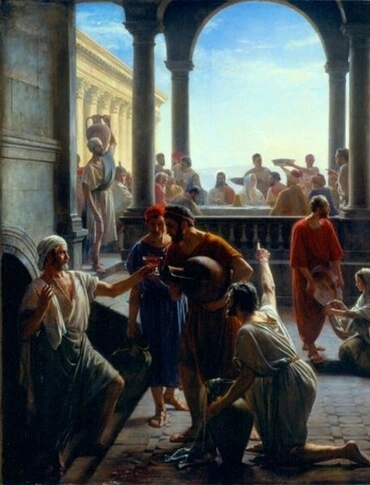9
ως δε εγευσατο ο αρχιτρικλινος το υδωρ οινον γεγενημενον και ουκ ηδει ποθεν εστιν οι δε διακονοι ηδεισαν οι ηντληκοτες το υδωρ φωνει τον νυμφιον ο αρχιτρικλινος
9
ως δε εγευσατο ο αρχιτρικλινος το υδωρ οινον γεγενημενον και ουκ ηδει ποθεν εστιν οι δε διακονοι ηδεισαν οι ηντληκοτες το υδωρ φωνει τον νυμφιον ο αρχιτρικλινος
Po New Christian Bible Study Staff

The ruler or governor of the feast represents basic principles of what it is to be good, the foundational ideas that guide people's lives. "Taste" represents the affection for knowing, the delight we feel in knowing new things. The idea of "whence" or where something came from represents its spiritual origins.
To "call" someone generally means to seek spiritual conjunction, and a bridegroom usually represents the Lord, especially in terms of his love and goodness.
This verse, then, shows the reaction when those receptive to the Lord brought the spiritual ideas represented by the wine into contact with their basic assumptions about being good in life. In short, it was astonishing and exciting, so much so that from those assumptions they turned to the Lord Himself, seeking conjunction.
It's interesting, though, that the verse specifically mentions that the servants knew where the wine came from while the governor did not. This shows that while people's external minds might have been impressed by the miracle – the fact that the new spiritual truth had come from the old ideas and teachings represented by the water in the waterpots – the principles represented by the governor were impressed by the quality of the spiritual truth itself. The governor didn't know the wine was miraculous, but was amazed simply by its quality.
©2024 New Christian Bible Study Corporation. All rights reserved. Printed from newchristianbiblestudy.org
ResponsiveVoice koristi se pod nekomercijalnom licencom 
©2024 New Christian Bible Study Corporation. Sva prava pridržana. Uvjeti korištenja | Politika privatnosti.